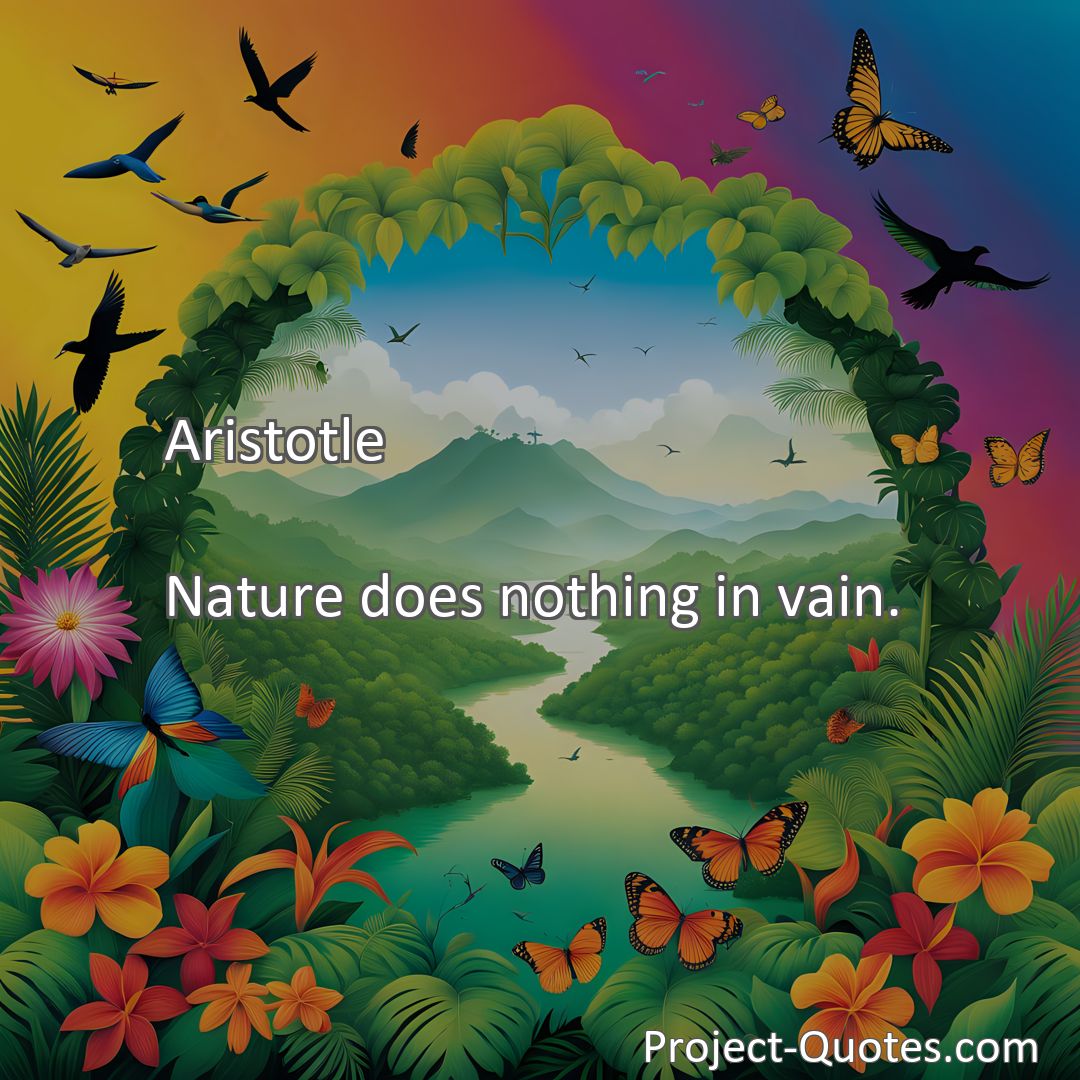Nature does nothing in vain.
Aristotle
“Sweet Fragrance: How Nature’s Purposeful Design Attracts Pollinators” takes us on a journey through the intricate and intentional design of nature. With vibrant colors and alluring scents, flowers attract pollinators like bees and butterflies, ensuring the continuation of their species. Aristotle’s wisdom reminds us that nature does nothing in vain and inspires us to appreciate and protect the delicate balance of the natural world.
Table of Contents
Meaning of Quote – Nature does nothing in vain.
Nature does nothing in vain. These wise words were spoken by Aristotle, an ancient Greek philosopher who contemplated the world around him and sought to understand the patterns and principles that govern our existence. In this simple yet profound quote, Aristotle captures the essence of nature’s purposefulness and intentionality.
When we observe the natural world, we cannot help but marvel at its intricacy and beauty. From the tiniest organisms to the grandest landscapes, every element seems to serve a purpose in the grand scheme of things. Take, for example, a delicate flower blooming in a meadow. Its vibrant colors and sweet fragrance attract pollinators, such as bees and butterflies, ensuring the continuation of its species. Even the humblest of creatures, like ants, work tirelessly to build intricate networks of tunnels and colonies, contributing to the overall functioning of their ecosystem.
Aristotle believed that nature, with all its diverse and interconnected elements, operates with a sense of purpose. Nothing exists in isolation; everything is part of a larger whole. Each living organism, each rock formation, and each weather pattern plays a role in maintaining the delicate balance and harmony of the natural world. This interdependence and harmony are evident in every aspect of nature, from the interactions between predator and prey to the cyclical patterns of the changing seasons.
The quote also suggests that nature does not engage in wasteful or futile activities. In other words, everything in nature has a reason for being. This concept can be seen in the countless examples of adaptation and survival strategies employed by different species. Animals have evolved specific traits, such as camouflage or unique hunting techniques, to increase their chances of survival. Plants have evolved different methods of seed dispersal to ensure their offspring find suitable environments to grow. Nature’s efficiency and economy of resources are truly remarkable.
It is worth noting that Aristotle’s view of nature extends beyond the mere physical realm. He believed that the natural world also embodies a moral and ethical dimension. According to Aristotle, humans have the capacity to emulate nature’s purposefulness and intentionality in their daily lives. Just as nature seeks to fulfill its potential and fulfill its role, so too should we strive to fulfill our potential as human beings and contribute to the betterment of society.
When we think about it, Aristotle’s quote challenges us to reflect on our own lives and actions. Are we living purposefully? Are we making the most of our abilities and talents? Do our actions contribute positively to the world around us? Nature, in all its wisdom, invites us to align ourselves with its principles and make a conscious effort to live in harmony with the natural world.
Furthermore, Aristotle’s perspective on nature can also shed light on the importance of sustainability and environmental stewardship. If nature does nothing in vain, it follows that we should not take its resources for granted or exploit them recklessly. Instead, we should recognize the intrinsic value of nature and strive to protect and preserve it for future generations.
When we acknowledge that nature does nothing in vain, we begin to recognize the interconnectedness of all things. We realize that our actions have consequences that ripple through the intricate web of life. By adopting a mindset informed by Aristotle’s quote, we can become more mindful of our impact on the environment and make choices that promote ecological balance and long-term sustainability.
In conclusion, nature does not act randomly or without purpose. Aristotle’s quote reminds us of the inherent order and intentionality in the natural world. From the tiniest insect to the vast expanse of the universe, everything serves a purpose and contributes to the greater whole. By recognizing and emulating nature’s purposefulness in our own lives, we can live more fulfilling and meaningful existences. Moreover, by understanding and respecting nature’s wisdom, we can strive to protect and preserve the delicate balance of our planet for generations to come.
I hope this quote inspired image brings you hope and peace. Share it with someone who needs it today!


